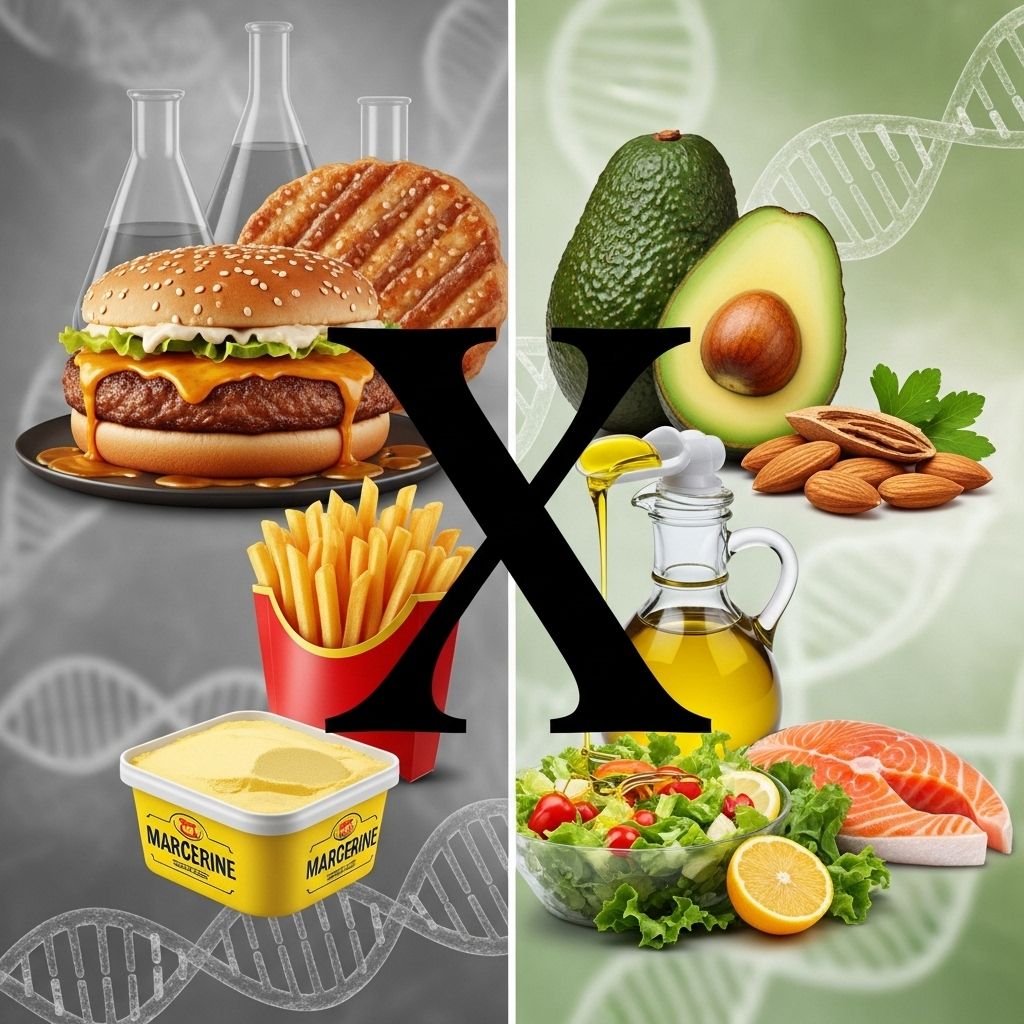5 Persistent Myths About Dietary Fat—Debunked by Science
Unveiling the truth about dietary fats: Heart health, cholesterol, weight gain, and what really belongs in a healthy diet.

For decades, dietary fat has been misunderstood and unfairly maligned. Evolving research has shattered many old beliefs about how fats influence cholesterol, heart disease, weight gain, and overall health. This article takes a deep dive into the most persistent myths about eating fat—equipping you with clear, science-backed truths for making healthier choices.
Table of Contents
- Myth #1: Fat Is Terrible for Your Heart
- Myth #2: High-Fat Foods Are Bad for Your Cholesterol
- Myth #3: Eating Fat Makes You Gain Weight
- Myth #4: Low-Fat or Nonfat Products Are Healthier
- Myth #5: All Plant-Based Fats Are Healthy
- Guide: How to Make Healthier Fat Choices
- Frequently Asked Questions
Myth #1: Fat Is Terrible for Your Heart
For years, public health advice emphasized slashing fat to prevent heart disease. But modern research reveals that fat, in and of itself, is not the villain it was once made out to be. In fact, some types of fats may protect heart health when included as part of a balanced diet.
The key is the type of fat consumed. Here’s how dietary fats stack up in relation to heart health:
- Unsaturated fats (found in olive oil, nuts, seeds, and fatty fish) can reduce inflammation and help lower risk of heart disease when they replace saturated or trans fats in the diet.
- Saturated fats (in butter, cheese, red meat, and certain tropical oils) can raise LDL (‘bad’) cholesterol but their exact role in heart disease risk is still debated. Moderation is advised.
- Trans fats (found in partially hydrogenated oils) unequivocally harm heart health and should be eliminated wherever possible.
In summary, fats aren’t inherently harmful to the heart; it’s the type and balance of fats that matter most for cardiovascular wellbeing.
Myth #2: High-Fat Foods Are Bad for Your Cholesterol
Not all high-fat foods have the same effect on cholesterol. The truth depends on the type of fat they contain.
- Unsaturated fats—particularly monounsaturated and polyunsaturated fats—can improve your cholesterol profile. Foods such as avocados, nuts (almonds, walnuts), fatty fish, and certain vegetable oils are linked to lower LDL (bad) cholesterol and higher HDL (good) cholesterol, which helps clear excess cholesterol from the blood.
- Saturated fats, widely found in animal products and some plant oils, raise LDL cholesterol and should be limited..
- Trans fats significantly increase LDL cholesterol and should strictly be avoided.
It’s essential to replace saturated and trans fats with unsaturated fats rather than just cutting out fat entirely. Swapping in unsaturated fats helps both lower harmful LDL cholesterol and boost protective HDL cholesterol, supporting heart health.
Table: Fat Types and Cholesterol Impact
| Fat Type | Sources | Effect on Cholesterol |
|---|---|---|
| Monounsaturated | Olive oil, avocado, nuts | Lower LDL, raise HDL |
| Polyunsaturated (Omega-3) | Fatty fish, flaxseed, walnuts | Lower LDL, raise HDL, reduce triglycerides |
| Saturated | Butter, cheese, red meat, palm & coconut oils | Raise LDL, little effect or may lower HDL |
| Trans fats | Processed foods, bakery items (industrial sources) | Raise LDL, lower HDL |
Myth #3: Eating Fat Makes You Gain Weight
This myth is rooted in a basic truth—fat is calorie-dense (9 calories per gram versus 4 for carbohydrates and protein)—but real-world evidence shows it’s overeating any nutrient (fat, protein, or carb) that leads to weight gain.
- Fat doesn’t automatically lead to weight gain. Multiple large studies—including one published in JAMA—found no significant difference in weight loss or gain between those on healthy low-fat diets and those on healthy low-carb diets, provided total calories were similar.
- Fat enhances satiety: Fat digests more slowly and triggers feelings of fullness, meaning you may feel satisfied on less food. This can naturally help with appetite control and weight management, especially when fat-rich foods replace highly processed carbohydrates.
- Restrictive low-fat diets can actually drive people to eat more processed carbs and sugars, which may result in more hunger and potential overeating.
The real culprit is excess calories from any source, not fat itself. Incorporating healthy fats can support weight management, especially when they’re part of a whole-food, balanced diet.
Myth #4: Low-Fat or Nonfat Products Are Healthier
The low-fat craze of past decades convinced many that lower fat always equals healthier. Unfortunately, food manufacturers often compensate for lost flavor by adding refined carbohydrates and added sugars to low-fat and nonfat products.
- These added sugars can increase blood triglyceride levels, disrupt insulin sensitivity, and raise blood pressure—each a separate risk factor for heart disease.
- The 2020–2025 Dietary Guidelines for Americans recommend limiting added sugars to 10% or less of daily calories.
Rather than assuming low-fat equals healthier, check nutrition labels for “hidden” sugars and refined carbs.
Whole, minimally processed foods with some natural fat are generally healthier than ultra-processed low-fat alternatives. For example, plain yogurt with a normal fat content may be a smarter choice than low-fat yogurt packed with sugar.
Myth #5: All Plant-Based Fats Are Healthy
Not all plant-based fats are created equal. While many plant-sourced fats like those in olive oil, avocados, and most nuts are indeed good for you, some plant oils are very high in saturated fat and can have negative effects on cholesterol:
- Coconut oil: About 83% saturated fat (higher than butter or bacon grease
References
- https://www.prevention.com/food-nutrition/healthy-eating/a44131564/myths-about-eating-fat/
- https://www.prevention.com/weight-loss/a20467668/5-myths-about-weight-loss-that-are-holding-you-back/
- https://www.niddk.nih.gov/health-information/weight-management/myths-nutrition-physical-activity
- https://www.prevention.com/food-nutrition/healthy-eating/a37503019/protein-myths/
- https://www.prevention.com/food-nutrition/a20481815/how-much-fat-should-i-eat-daily/
- https://www.prevention.com/food-nutrition/healthy-eating/a65788242/myths-recent-food-headlines/
- https://www.prevention.com/health/g20481372/5-bmi-myths-you-need-to-stop-believing/
- https://www.prevention.com
- https://www.prevention.com/food-nutrition/healthy-eating/a63423411/foods-you-should-not-eat/
Read full bio of medha deb












